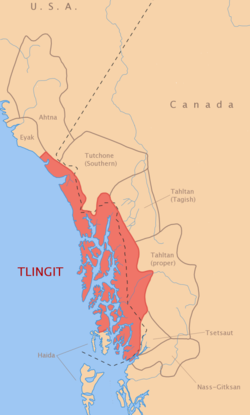特林吉特语
外观
| 特林吉特语 | |
|---|---|
| Tlingit Lingít | |
| 发音 | /ɬɪŋkɪ́t/ |
| 母语国家和地区 | 美国、加拿大 |
| 区域 | 阿拉斯加、卑斯省、育空、华盛顿州 |
| 族群 | 特林吉特人 |
母语使用人数 | 845 (Krauss 1995) |
| 语系 | |
| 文字 | 拉丁字母(特林吉特字母) |
| 官方地位 | |
| 作为官方语言 | |
| 语言代码 | |
| ISO 639-2 | tli |
| ISO 639-3 | tli |
| ELP | Tlingit |
 | |
| 濒危程度 | |
| 联合国教科文组织认定的濒危语言[2] 极度危险(UNESCO) | |
特林吉特语(英语:Tlingit language,发音为/ˈklɪŋkɪt/;特林吉特语:Lingít 宽式IPA:/ɬɪŋkɪ́t/[3])是美国阿拉斯加东南部及加拿大西部特林吉特人通行的语言,是纳-德内语系的成员之一。特林吉特语是一种濒危语言,现存在生的母语人口只余下140人,当中大多数都是英语的双语人。现时在阿拉斯加正努力保存特林吉特语的语言及文化。
特林吉特语的其中一个特色,是:它虽然有着丰富的边音辅音(/tɬ, tɬʰ, tɬ', ɬ, ɬ'/),但却没有最常见的/l/[4]。
参考资料
[编辑]- ^ Alaska OKs Bill Making Native Languages Official. npr.org. [2019-06-16]. (原始内容存档于2015-05-06).
- ^ UNESCO Atlas of the World's Languages in danger, UNESCO
- ^ Maddieson, Ian; Smith, Caroline L.; & Bessell, Nicola. Aspects of the phonetics of Tlingit. Anthropological Linguistics. 2001, 43 (2): 135–176.
- ^ 虽然[l]在某些较年长的语言人口中存在,但这个音其实是以/n/的同音位出现。不过,若我们把这个音当中是/l/音素的话,那么,这些说话的人就会连鼻辅音也没有。
延伸阅读
[编辑]- Beck, David. (2001). "Conventionality and lexical classes", pp. 19–26 in Proceedings of WSCLA 5: The Workshop on Structure and Constituency in Languages of the Americas, Gessner, Suzanne; Oh, Sunyoung; & Shiobara, Kayono (eds.). Volume 5 of Working Papers in Linguistics. University of British Columbia: Vancouver, British Columbia.
- Bird, Sonya. (2001). "What is a word? Evidence from a computational approach to Navajo verbal morphology", pp. 27–35 in Proceedings of WSCLA 5: The Workshop on Structure and Constituency in Languages of the Americas, Gessner, Suzanne; Oh, Sunyoung; & Shiobara, Kayono (eds.). Volume 5 of Working Papers in Linguistics. University of British Columbia: Vancouver, British Columbia.
- Boas, Franz. (1917). Grammatical notes on the language of the Tlingit Indians. University of Pennsylvania Museum anthropological publications.
- Cable, Seth. (2004). A metrical analysis of syncope in Tlingit. Manuscript. [1]
- Dauenhauer, Nora M.; & Dauenhauer, Richard (Eds.). (1987). Haa Shuká, Our Ancestors. Number 1 in Classics of Tlingit Oral Literature. University of Washington & Sealaska Heritage Foundation: Seattle, Washington.
- ——— (1990). Haa Tuwunáagu Yís, For Healing Our Spirit. Number 2 in Classics of Tlingit Oral Literature. University of Washington & Sealaska Heritage Foundation: Seattle, Washington.
- ——— (Eds.). (1994). Haa K̲usteeyí, Our Culture: Tlingit life stories. Number 3 in Classics of Tlingit Oral Literature. University of Washington & Sealaska Heritage Foundation: Seattle, Washington.
- ——— (Eds.). (1995). "A Tlingit ceremonial speech by Willie Marks", pp. 239–244 in Dürr, M; Renner, E.; & Oleschinski, W. (Eds.), Language and Culture in Native North America: Studies in honor of Heinz-Jürgen Pinnow. Number 2 in LINCOM Studies in Native American Linguistics. LINCOM: Munich, Germany. ISBN 3-89586-004-2.
- ——— (2000). Beginning Tlingit, 4th ed. Sealaska Heritage Foundation Press: Juneau, Alaska. ISBN 0-9679311-1-8. First edition 1994.
- ——— (2002). Lingít X̲'éinax̲ Sá! Say it in Tlingit: A Tlingit phrase book. Sealaska Heritage Institute: Juneau, Alaska. ISBN 0-9679311-1-8.
- ——— (2002). Intermediate Tlingit (draft). Manuscript.
- Dauenhauer, Richard. (1974). Text and context of Tlingit oral tradition. PhD dissertation. University of Wisconsin: Madison, Wisconsin.
- Dryer, Matthew. (1985). "Tlingit: An object-initial language?", Canadian Journal of Linguistics 30:1–13.
- Goddard, Pliny Earle. (1920). "Has Tlingit a genetic relationship to Athapascan", International Journal of American Linguistics 1:266–279.
- Leer, Jeffery A. (1979). Proto-Athabaskan Verb Stem Variation, Part One: Phonology. Volume 1 in Alaska Native Language Center Research Papers. Alaska Native Language Center: Fairbanks, Alaska.
- ——— (1990). Tlingit: A portmanteau language family? In P. Baldi (Ed.), Linguistics change and reconstruction methodology (pp. 73–98). Mouton de Gruyter: Berlin, Germany.
- ——— (1991). The Schetic Categories of the Tlingit verb. PhD dissertation. University of Chicago Department of Linguistics: Chicago, Illinois.
- ——— (2000). "The negative/irrealis category in Athabaskan–Eyak–Tlingit", ch. 6 pp. 101–138 in The Athabaskan Languages: Perspectives on a Native American Language Family, Fernald, Theodore B. & Platero, Paul R. (eds.). Volume 24 in Oxford Studies in Anthropological Linguistics. Oxford University Press: Oxford, England. ISBN 0-19-511947-9.
- Leer, Jeff; Hitch, David; & Ritter, John. (2001). Interior Tlingit Noun Dictionary: The dialects spoken by Tlingit elders of Carcross and Teslin, Yukon, and Atlin, British Columbia. Yukon Native Language Center: Whitehorse, Yukon. ISBN 1-55242-227-5.
- Maddieson, Ian; Smith, Caroline L.; & Bessell, Nicola. (2001). Aspects of the phonetics of Tlingit. Anthropological Linguistics 43(2): 135–176.
- Naish, Constance M. (1966). A syntactic study of Tlingit. Master's dissertation. University of North Dakota.
- Naish, Constance M.; & Story, Gillian L. (1973). Tlingit verb dictionary. Summer Institute of Linguistics: College, Alaska. ISBN 0-933769-25-3
- ——— (1996). The English-Tlingit dictionary: Nouns (3rd ed.; H. Davis & J. Leer, Eds.). Sheldon Jackson College: Sitka, Alaska. (Revision of the Naish-Story dictionary of 1963.)
- Pinnow, Heinz-Jürgen. (1962). "Two problems of the historical phonology of Na-Dene languages". International Journal of American Linguistics, 28:162–166.
- ——— (1966). Grundzüge einer historischen Lautlehre des Tlingit: ein Versuch. Wiesbaden: Harrassowitz.
- ——— (1976). Geschichte der Na-Dene-Forschung. (Indiana : Beihefte ; 5). Berlin: Mann. ISBN 3-7861-3027-2
- Swanton, John. (1911). "Tlingit", pp. 159–204 in Handbook of American Indian Languages. U.S. Government Printing Office: Washington, D.C.
- Swanton, John Reed. Tlingit myths and texts. Govt. Printing Office. 1909 [26 August 2012].
外部链接
[编辑]- Lingít Yoo X̲'atángi: The Tlingit Language
- Tlingit Teaching and Learning Aids
- Alaskan Orthodox Christian texts (Tlingit) (页面存档备份,存于互联网档案馆)
- The Russian Church and Native Alaskan Cultures: Preserving Native Languages (页面存档备份,存于互联网档案馆)
- Yukon Native Language Centre
- Talking about Beliefs: The Alaskan Tlingit language today
- Anash Interactive

